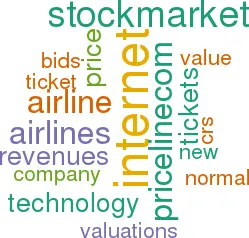Airline valuations and the mysteries of cyberspace
May 1999


The Internet is revolutionising business, and the share prices of many new technology companies are soaring. So how does the airline business cash in?
Currently the bull stock–market in the US is being driven by new technology IPOs. The valuations being placed on these internet companies are frankly baffling: many of them have little or no cashflow but are attracting investors on the promise of futuristic concepts and wonderful product developments (and quick returns on punts). At the same time, airlines are moving more and more into electronic distribution and are trying to promote use of the Internet for ticket sales (see Aviation Strategy, March and April 1999).
These two trends come together in a company called Priceline.com, which IPOed at the end of March and whose share price has doubled since then to a price which means that it is now theoretically worth $14bn-$15bn. Its price/revenue ratio puts it in the same league as Internet giants such as Amazon.com.
Priceline.com is essentially a proprietary trading system for airline tickets and hotel rooms (and which is now expanding into cars, mortgages and others). Customers can buy tickets by posting bids, dates and conditions on the company’s web site. Priceline.com then attempts to purchase tickets from 18 US and international airlines, aiming to obtain the best possible discounts. Only 35% of “reasonable” bids (defined as no more than 30% below the normal APEX fare) are matched at the first attempt but on popular routes Priceline.com claims to find tickets for more than 70% of reasonable bids. There are no cancellations: if the bid is accepted, the customer’s credit card is debited.
This is an original concept but the fact remains that the company had air ticket revenues of only about $200m in 1998 and is not expected by analysts to turn a profit until 2001. Interestingly, Delta owns about 10% of Priceline.com, (which should be worth $1.5bn), but Delta’s own stock–market value is $10.2bn, its revenues are $14.4bn and its net profit about $1.1bn. Evidently, normal financial laws are suspended in cyberspace.
Perhaps a more sustainable airline/internet connection is represented by Travelocity.com, which is being developed by Sabre, which in turn is 80% owned by AMR Corp, the parent of American. This company acts as a normal travel agency but only on the Internet. Revenues are estimated to be in the order of $500m a year (but this is revenue just from commissions generated, whereas Priceline.com’s revenues represent the total price of the ticket sales).
So if Travelocity.com were to be spun off (some form of IPO has been rumoured) then it should logically (internet logic, that is) command a price well above Priceline.com’s $14bn. Yet AMR’s stock–market valuation is just over $9bn and, as well as the airline, it owns 80% of the second largest CRS in the world.
>Impact on CRSs
There are also indications that CRSs, as an electronic service, are being affected by the speculation in new technology stocks. In April two airlines announced plans to cash in: United intends to sell 17% of Galileo and KLM 10%. These secondary public offerings are expected to raise $900m and $555m respectively.
These appear to be modest transactions compared to the Internet plays. But again, a few comparisons are intriguing. In KLM’s case the 10% ownership of this CRS therefore equates to 26% of the airline’s stock–market value. In United’s case its total 32% ownership of Galileo is the equivalent of 18% of its stock–market value. There is still currency in Bob Crandall’s famous statement to the effect that he would like to sell American Airlines and keep the Sabre CRS.
Beyond all the stock–market hype there is a message: that there is a strong belief that the Internet and technology related to it will fundamentally change airline distribution. The trouble is that nobody is exactly sure how, and there is even less of an idea as to who are going to be the winners and losers in this game. Hence, the strange valuations.